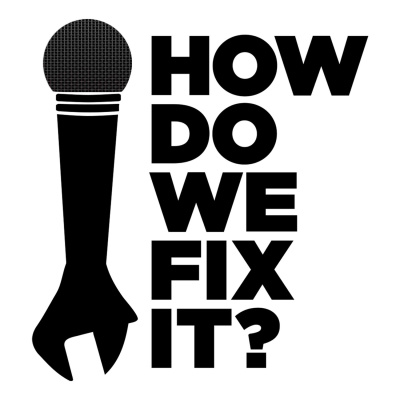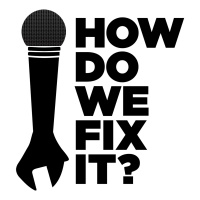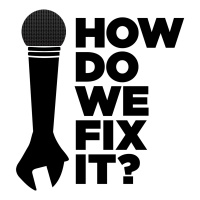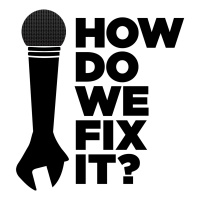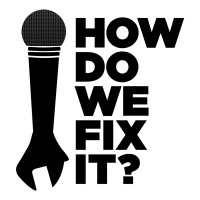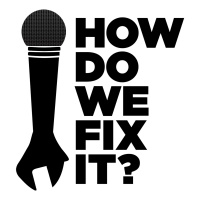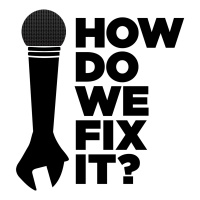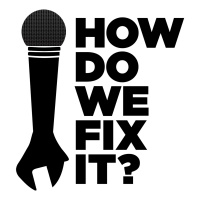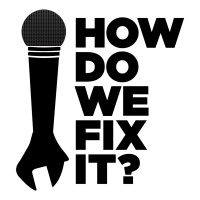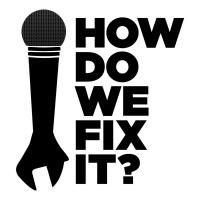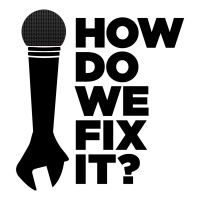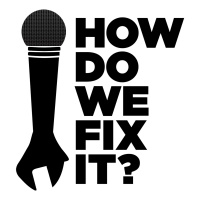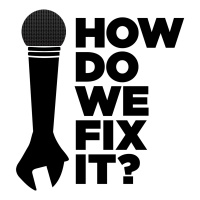Synopsis
From politics to the personal, we're about solutions. Our weekly podcast features two friends and longtime journalists. Join Richard Davies (ABC News) and Jim Meigs (Popular Mechanics) as they challenge authors, experts and provocateurs in a search for positive, practical ideas. Guests include Alan Dershowitz, a noted legal scholar and defender of civil liberties; Mike Rowe of "Dirty Jobs" and Lenore Skenazy, founder of "Free Range Kids." Topics include politics, parenting, personal finance, human behavior and much more. "How Do We Fix It?" - a repair manual for the real world. Produced by DaviesContent
Episodes
-
Love Your Enemies - Arthur Brooks - 1
21/03/2019 Duration: 23minThis podcast is an urgent, radical, yet practical response to the crisis of political polarization that is tearing America apart. Instead of mere tolerance and civility, we discuss how and why we should love our enemies.A response is needed to our culture of contempt, where many think of those who they disagree with as bad people. Millions are organizing their social lives and curating their news and information to avoid hearing viewpoints different than their own.The Outrage Industrial Complex-- angry politicians, cable TV and talk radio pundits, campus activists and Twitter trolls-- profits out of making us miserable and wrecking public life. An exhausted majority of Americans is tired of how divided we've become. This show looks at how to fix it.In his new book, "Love Your Enemies: How Decent People Can Save America From the Culture of Contempt", best-selling author and social scientist, Arthur Brooks, makes the case for something that is far more life affirming than mere tole
-
Roundup: Pesticides and Health. Carey Gillam
15/03/2019 Duration: 24minMonsanto's controversial Roundup herbicide is the world's top-selling weed killer. But tens of billions of dollars in sales and profits are at stake because of questions about the safety of glyphosate, the product's key ingredient. Does Roundup cause cancer? Is it linked to cases of non-Hodgkin Lymphoma? Are GMO crops allies or enemies in the fight for a more sustainable environment?More than 11,200 lawsuits have been filed, claiming that Roundup causes cancer. A major trial is now underway in federal court in San Francisco. A 70-year-old California man alleges that he got sick because he used Roundup on his property for many years. The trial is hearing a range of opinions. This episode features former Reuters correspondent, investigative journalist, and advocate Carey Gillam-- the author of “Whitewash —The Story of a Weedkiller, Cancer and the Corruption of Science.” Carey's book won the Rachel Carson book award from the Society of Environmental Jou
-
The Green New Deal Unpacked: Megan McArdle
07/03/2019 Duration: 23minRepresentative Alexandria Ocasio-Cortez didn't waste any time getting started in Congress. The first-term Democrat boldly proposed The Green New Deal, one of the most ambitious policy proposals in decades.Precise details are fuzzy, but the broad strokes suggest that the Green New Deal calls on the federal government to ban virtually all fossil fuels, replace most cars and airplanes with trains and other forms of public transportation, build a smart electricity grid, strengthen trade unions, retrofit every building in the country, give everyone free college, free healthcare, and a guaranteed job.But would it prevent climate change? By including a series of highly ambitious left-wing proposals on economic and social policy, is the Green New Deal debate a distraction from constructive efforts to address carbon emissions, pollution and global warming?Our guest, Megan McArdle, is a Washington Post columnist and author of the book "The Upside of Down:Why Failing Well is the Key to Succ
-
New Thinking on Migration: Tolu Olubumni
28/02/2019 Duration: 21minMigration is an emotional, super-charged issue, sparking fierce debates, angry protests and influencing election results around the world. From President Trump's demand for a border wall to the long controversy over Brexit, migration is seen by many as a threat. But movement of people across borders is inevitable, and has always played a major role in economic growth and technological innovation. Today, global migration is at a record high-- up 50% in less than twenty years. An estimated 244 million people, or about 3.3% of the world’s population, were born in one country and now live in another. Often, solutions to the world's problems involve an unsexy truth: Better management. This episode looks at the need for safe, orderly and regular migration. The alternative to international cooperation is often violence and chaos, leading to great human suffering.Our guest is Tolu Olubunmi, host of the podcast, "A Way Home Together: Stories of the Human Journey". Tolu is a
-
Green New Nuclear Deal: Jim Meigs
21/02/2019 Duration: 26minThe climate change debate is heating up. Record numbers of people no longer see extreme climate as a distant threat, but as a crisis that is unfolding right now. According to a Yale survey, "the proportion of Americans who are very worried about global warming has more than tripled since its lowest point in 2011." Despite opposition by activist groups, support for carbon-free nuclear power is growing among climate scientists and environmentalists as they search for ways to eliminate greenhouse gas emissions.In this episode, Richard quizzes co-host Jim Meigs, who argues in the latest edition of City Journal that nuclear is the best source of clean, reliable and safe energy.We consider concerns about cost, nuclear waste, power plant safety, and look at what really happened after disasters at Three Mile Island, Chernobyl and Fukushima. Jim explains why subsidies for wind and solar have led to the construction of more polluting natural gas plants, instead of no-e
-
Work Versus College: Oren Cass
15/02/2019 Duration: 28minThe American worker is in crisis. Wages have stagnated for several decades. Despite nearly a decade of continuous economic growth and falling unemployment (as defined by official statistics), the percentage of Americans in the workforce is still well below normal levels. For the first time in modern memory, life expectancy has started to fall, as substance abuse and obesity rates rise. Our guest in this episode, Oren Cass, argues that we've abandoned the American worker, and pushed four-college at the cost of other, more effective, solutions.In his widely-praised new book, "The Once and Future Worker", Oren argues that government policy should emphasize production, not consumption. His arguments were summarized in The Atlantic."We've become obsessed with consumerism-- measuring everything in terms of consumers and living standards... In the process, we've forgotten that producing stuff is important too.Oren Cass is a senior fellow at the Manha
-
Getting off Facebook: Wade Roush
07/02/2019 Duration: 24minLife as a teenager is proving traumatic for Facebook. The social media juggernaut turned 15 this month. The company has gone from being universally celebrated for changing the way we communicate, to a troubled adolescent with serious questions about its entire business model. Critics say Facebook ignored hate speech on its site and played down destructive actions by internet trolls and other bad actors. More than two-thirds of American adults are Facebook users, but surveys show that many more of us are increasingly uncomfortable that Facebook, Instagram and WhatsApp-- all owned by the same parent company-- know so much about our private lives. Many of us have a conflicted relationship with social media. While disturbed about the lack of transparency and the invasion of privacy, we find it hard to walk away from friends, colleagues and family members who share photos, memories and much more on the world's biggest website.Our guest, "Soonish" podcast host and technology
-
Our Journalism Crisis: A Conversation
31/01/2019 Duration: 24minThe public's faith in journalism is at the lowest point in living memory. A recent Gallup poll for the Knight Foundation found that most U.S. adults said they personally have lost trust in the news media in recent years. More than 9 in 10 Republicans feel this way. The recent uproar over the rush to judgement and media coverage of the Covington Catholic story is the latest damaging controversy. “Boys in Make America Great Again Hats Mob Native Elder at Indigenous Peoples March,” was the first New York Times headline about what happened. But by the next day a much more complex picture began to emerge of what had happened. "The weekend began to take a long, bad turn for respected news outlets and righteous celebrities," wrote Caitlin Flanagan in a long and thoughtful analysis in The Atlantic about why the media "botched" the story.The news business is also reeling from years of job losses and budget cuts. Newsrooms at many local and regional newspapers have been
-
Our Government Crisis: Philip K. HowardUntitled Episode
25/01/2019 Duration: 25minThe longest-ever federal government shutdown and the flawed Presidency of Donald Trump are symptoms of something far deeper: Dysfunction in Washington.In this episode, Philip K. Howard attacks the failed ideologies of Republicans and Democrats, and calls for a radical simplification of government to re-empower Americans in their daily choices. Americans are a practical people, he says. They want government to be practical."Unfortunately, we got this idea in the 1960's that we could solve the problems of human fallibility by just telling everybody how to do everything," Philip tells us. "Rules are the ultimate dictator, and even worse, you can't yell at them."For more than a decade, Philip has been campaigning for a government that works. He is an expert on the effects of modern law and bureaucracy on human behavior. Philip is the author of several books, including the best-seller “The Death of Common Sense: How Law Is Suffocating America” and, “Try Common Sense: Replacing Failed Ideol
-
A Cure for Massive Violence: Rachel Kleinfeld
17/01/2019 Duration: 32minThe terrible bloodshed in Syria, Yemen, and other countries at war capture global headlines. But the vast majority of killings in countries around the world are neither the result of warfare nor terrorism. Homicides by gangs, organized crime groups, paramilitary death squads, and ordinary people are the most common cause of violent deaths. More people have died in Mexico in recent years than in Iraq and Afghanistan combined. Murder rates in four U.S. cities are higher than in Latin American centers known for their past violence. Rachel Kleinfeld, a senior fellow in the Democracy, Conflict and Governance Program at the Carnegie Endowment for International Peace is our guest in this episode. Her new book, "A Savage Order: How the World's Deadliest Countries Can Forge a Path to Security", is an urgent look at how many countries, once overwhelmed by massive violence, have since recovered.What are the specific steps needed to reduce the hugely uneven impact of "privilege violence?"&nb
-
The Fight to End Gerrymandering: Katie Fahey
10/01/2019 Duration: 26minWith a simple Facebook post saying that she wanted to end partisan gerrymandering, Katie Fahey sparked the beginnings of an extraordinary grassroots campaign. Katie is in her late 20's. With neither connections nor deep pockets, she started Voters Not Politicians to change Michigan's State Constitution. Hundreds of thousands of signatures were collected,. The movement pulled off a remarkable feat, winning a ballot measure that will create an independent citizen commission to decide the shape of congressional and state legislature districts. The goal was simple: voters - not politicians or lobbyists - would compromise and draw electoral maps that cannot favor one party or candidate. When the campaign needed money to print petitions and organize meetings, volunteers asked family and friends to contribute. See acast.com/privacy for privacy and opt-out information.
-
8 For ‘18. The Year’s Big Lessons
28/12/2018 Duration: 24minIn a year of crazy politics, disdain for the views of experts, and deep partisan divisions, we look beyond anger and fear stoked by cable TV, talk radio and social media to learn eight deeper lessons of where we are today and in what direction we are headed.Here are the eight “Fix It” takeaways as we head into 2019. Warning: Some are hopeful!1. “Women just aren’t going to take it anymore.” We discuss the growing power of women in politics, entertainment and hear why workplace programs to stop the widespread crisis of sexual harassment could be so much better than most initiatives are today. 2. “Debt is back in a big, bad way. Why the debate over rising federal deficits and the nation’s debt mountain will grow in 2019. 3. “The economy slows down and financial worries heat up.”As Wall Street volatility returns, reporter and author Diana Henriques tells us what new financial protections are needed to prevent a future meltdown.4. “Don’t count capitalism out.” We pushback against
-
The Power of Reading: Professor Joesph Luzzi
21/12/2018 Duration: 23minAmerica is facing a reading crisis. According to a government survey the number of adults who read for pleasure has fallen by more than 30% in less than 15 years. Another recent study found that Americans watch an average of three hours of TV a day, compared to less than half-an-hour spent reading."Reading is seeing the world through someone else's eyes", says Professor Joseph Luzzi of Bard College , our guest in this episode. "Social media is a mirror," says Joseph. "You look into it and your tastes and interests are reflected back on you. Literature is a prism. You look into it and you are engaged, as Virginia Wolfe said, with the mind of someone else."The decline in reading and the popularity of social media may have profound impacts on democracy, feeding into our deep partisan division, and reinforcing extreme opinions.We discuss how reading Dante helped save Joseph after he became a widower and a father on the same day. We also learn about his 4-for-45 prescri
-
China: The Challenge & Threat: Elizabeth Economy
13/12/2018 Duration: 26minThe high stakes show-down between the U.S. and China on tariffs, trade and cyber security threatens to disrupt the global economy. Growing tensions were temporarily put on pause during a recent meeting at the Group of 20 summit between President Trump and China's leader Xi Jinping. But many long-term challenges remain. Relations with China are the most important foreign policy issue.The Trump Administration imposed tariffs on $250 billion of Chinese goods and has pushed back against China's trade policies and aggressive attempts to exploit U.S. technology to boost its own economy. Under Xi, China has reversed a three-decade trend towards greater political and economic opening. In this episode we look at how the U.S. and the West should deal with a more assertive, confident and anti-democratic China. Our guest is the respected scholar, Elizabeth Economy, Director for Asia Studies at The Council on Foreign Relations and the author of the highly praised book, "The Third Revolut
-
Our Many Perception Gaps: Sam Laine Perfas
07/12/2018 Duration: 28minWhat you think is true doesn't necessarily line up with reality. From the heated debate over gun violence deaths to our views about violent crime and global poverty, many of us have serious perception gaps. Democracy can be damaged when public opinion is out-of-step with the facts.The opioid epidemic is often in the headlines and was recently declared a public health emergency. But did you know there's another substance that kills far more people every year? Another example: massacres at schools, malls and other public places get massive media coverage, but they account for a tiny percentage of gun deaths.Our guest in this episode is Samantha Laine Perfas, host of the new podcast series, "Perception Gaps". She tells us "there are things we perceive to be true that are simply not. And challenging us to think about these misperceptions... begins to peel back the layers of why we believe what we believe."We hear fascinating and deeply personal stories from several recent guests on "Perception
-
Has The Opioid Crisis Peaked? Sam Quinones
28/11/2018 Duration: 22minThe opioid and heroin epidemic has caused massive destruction suffering and pain. After rising for many decades, America’s life expectancy rate has dropped for the past two years in a row. Nearly 50 thousand Americans last year were the victims of opioid overdose deaths--twice the rate of other wealthy nations.But now, because of impressive initiatives to tackle the crisis, there are small glimmers of hope. The death-rate might be starting to fall. This month, a New York Times report highlighted a plunge in fatal overdoses in Dayton, Ohio, which had one of the highest rates in 2017.Among the possible solutions we hear about is GROW, a local effort that dispatches teams of social workers, medics, police officers and recovery experts to the homes of people who've overdosed. We also discuss the FDA's approval of the controversial synthetic opioid, Dsuvia, to treat cases of extreme pain, and the recent passage of a bipartisan bill to fight the
-
AI Will Change All of US: Kai-Fu Lee
23/11/2018 Duration: 20minArtificial intelligence will lead to sweeping changes in our society, economy and relationship with work. China has suddenly caught up with The United States and will exercise much greater technological power in the future."We will not have to do routine jobs anymore," says our guest, Kai-Fu-Lee. "AI will take over in the next 15 to 20 years all the routine jobs that we have and work efficiently and essentially for free and 24/7 with no complaints."This creates both daunting and exciting challenges for our future, argues Dr. Lee, who is one of the world's leading AI experts. He has been in AI research, development and investment for more than thirty years.His new book is "AI Super-Powers: China, Silicon Valley and The New York Order."We discuss deep learning and how AI can learn things by itself, recognizing faces, speech and patterns. Artificial can do sophisticated customer service, telemarketing, loan approvals and many forms of blue-collar work such as dishwashing, fruit picking and as
-
Thanks a Thousand. Gratitude: A.J. Jacobs
15/11/2018 Duration: 25minJust in time for Thanksgiving, we speak with best-selling author and "immersive journalist" A.J. Jacobs about his extraordinary gratitude project and brand new book, "Thanks a Thousand".He decided to say "thank you" to every single person involved in producing his morning cup of coffee. "It turned out to be thousands of people," A.J. tells us. "I thanked the barista, the lid designer and the coffee bean farmer, but also the truck driver who delivered the beans. The idea is to show the interdependence and interconnectivity of our world."We hear useful insights about gratitude, including tips that can be helpful and fun at Thanksgiving Day gatherings. This episode is a joint "simul-pod" with our friends at "Half Hour of Heterodoxy" podcast. Deb Mashek, Executive Director of the Heterodox Academy is the co-host along with Richard and Jim. In our confrontational and troubled times, this episode is a reminder that cooperation plays a vital role in many of the most basic human rit
-
Election Special: Our Take
08/11/2018 Duration: 20minWhat are the most inspiring, exasperating, unique, important, and first-in-our-lifetime results from the Midterm Elections? In this special edition, Jim and Richard give their Quick Fixes take on how American voted.We discuss: Donald Trump's turnout gift, why the economy played a far larger role than election analysts admit; the serious problems that now face both Republicans and Democrats, the insidious impact of gerrymandering, how celebrities failed to motivate voters, and why the handwringing about money in politics has been put on hold for now.From Glenn Reynolds' view that the result was more of a purple puddle than a blue wave, to why the year of the woman shattered fund-raising and attention-getting glass ceilings, this record-setting election can be interpreted in a variety of interesting ways.As for what's next? Jim and Richard discuss the power of small solutions and why the new Congress must focus on legislation as well as investigations. See acas
-
Title: Bridging Divide. ReCity. Durham, North Carolina
01/11/2018 Duration: 30minHow can America recover from hatred, distrust and resentment that have lead to deep divisions, the fraying of our civic institutions and even violence, such as the recent Pittsburgh synagogue shooting?This episode, recorded at ReCity in Durham, North Carolina, is the third in our renewing democracy podcasts, where we report on collaborative efforts to promote respect and bridge divides.The idea behind this series is that if we’re going to pull back from the political precipice, it’s going to come first locally, not nationally. We’ve seen what hate and fear and can do, perhaps it’s time to try love, or at least tolerance. ReCity is a shared office space-- similar to a We Works for dozens of local social action non-profits and companies-- where organizations are housed in an open-plan office under one roof. We look at how their hard work can bring people together and lead to social change. "I believe there is hope for our communities, but when you turn on the news right n
